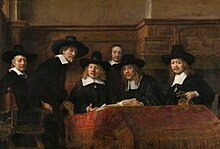
Back Gildes Afrikaans جيلد Arabic Търговска гилдия Bulgarian Guilda Catalan Gilda Czech Gilde Danish Gilde (Berufsverband) German Guilda Spanish Gild Estonian صنف Persian

A guild (/ɡɪld/ GILD) is an association of artisans and merchants who oversee the practice of their craft/trade in a particular territory. The earliest types of guild formed as organizations of tradespeople belonging to a professional association. They sometimes depended on grants of letters patent from a monarch or other ruler to enforce the flow of trade to their self-employed members, and to retain ownership of tools and the supply of materials, but most were regulated by the local government. Guild members found guilty of cheating the public would be fined or banned from the guild. A lasting legacy of traditional guilds are the guildhalls constructed and used as guild meeting-places.
Typically the key "privilege" was that only guild members were allowed to sell their goods or practice their skill within the city. There might be controls on minimum or maximum prices, hours of trading, numbers of apprentices, and many other things. Critics argued that these rules reduced free competition, but defenders maintained that they protected professional standards.[1]
An important result of the guild framework was the emergence of universities at Bologna (established in 1088), Oxford (at least since 1096) and Paris (c. 1150); they originated as guilds of students (as at Bologna) or of masters (as at Paris).[2]
- ^ Gies, Joseph; Gies, Frances (1969). Life in a medieval city. Crowell. ISBN 978-0-213-76379-4. OCLC 70662.
- ^ Rashdall, Hastings (1895). The Universities of Europe in the Middle Ages: Salerno. Bologna. Paris. Clarendon Press. pp. 150.